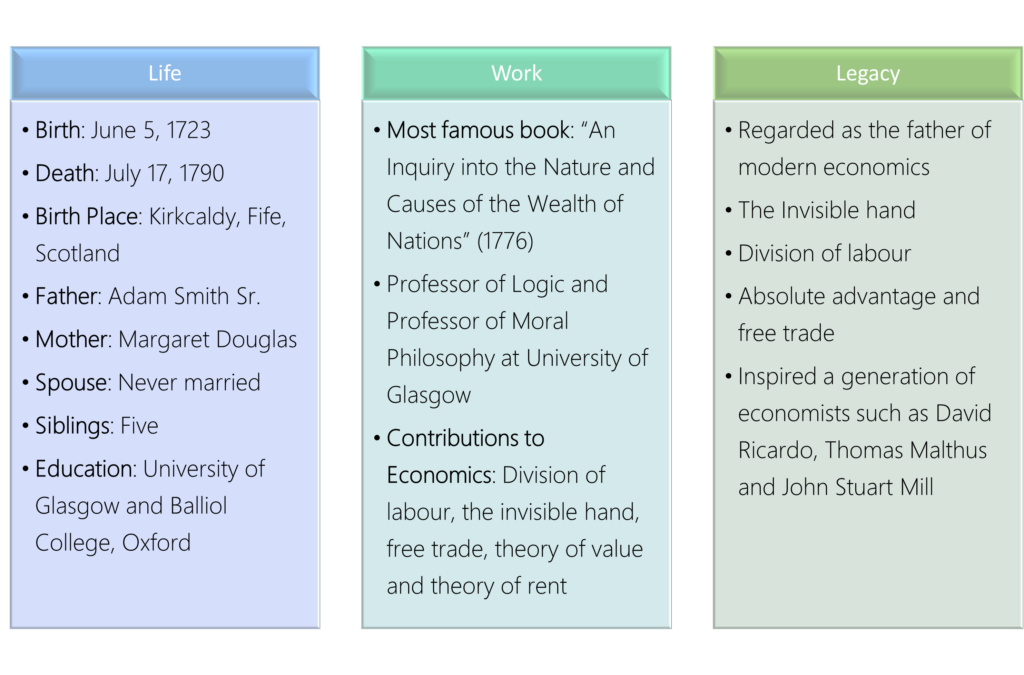Adam Smith was a Scottish economist and philosopher who is regarded as the father of modern economics. His contributions to economics are significant. His ideas and theories profoundly influenced economics, philosophy and politics. Several economists such as David Ricardo were inspired by his works and developed his ideas further. Adam Smith introduced the ideas of free markets and the invisible hand in economics. These ideas were instrumental in laying the foundations of modern economic theory.

Econometrics Tutorials with Certificates
the life of adam smith
Family and Background
Adam Smith was born on June 5, 1723, in Kirkcaldy, Fife, Scotland. He was the fourth of six children born to Margaret Douglas and Adam Smith Sr. His father was a lawyer, judge, and customs official, who died just a few months before Adam Smith was born. Following his father’s death, his mother raised the children with the help of relatives. She placed a strong emphasis on the education of her children. Smith was educated at home and then attended the Burgh School of Kirkcaldy, where he excelled academically.
Adam Smith was educated at the University of Glasgow and Balliol College, Oxford. After completing his education, he worked as a tutor and later became a professor of logic. Later, he became a professor of moral philosophy at the University of Glasgow. It was during this time that he developed many of the ideas that would become the basis of his influential book, “The Wealth of Nations,” which was published in 1776.
Although Smith never married or had children of his own, he had close relationships with his mother, siblings, and extended family. His siblings also went on to have successful careers in various fields, including law, medicine, and the military. Adam Smith died on July 17, 1790, at the age of 67.
Occupations
- Tutor: Smith worked as a tutor for the young Duke of Buccleuch while he was a student at Oxford University.
- Professor of Logic: After returning from Oxford, Smith became a professor of logic at the University of Glasgow in 1751.
- Professor of Moral Philosophy: Smith later became a professor of moral philosophy at the University of Glasgow in 1752.
- Author: Smith wrote several books and papers on a variety of topics, including economics, ethics, and philosophy. His most famous work is “The Wealth of Nations,” published in 1776.
- Government Official: In 1778, Smith was appointed commissioner of customs in Scotland by the British government. He held this position until his death in 1790.
Major publications
Adam Smith wrote several influential books and essays. Some of his most important publications are:
- “The Theory of Moral Sentiments” (1759): In this book, Smith explored the nature of human morality and the role of sympathy and self-interest in moral decision-making.
- “Lectures on Rhetoric and Belles Lettres” (1762-1763): This is a collection of Smith’s lectures on language, literature, and rhetoric.
- “An Inquiry into the Nature and Causes of the Wealth of Nations” (1776): This is Smith’s most famous work, in which he advocated for the principles of free-market capitalism. He argued that specialization, division of labour, and competition are key drivers of economic growth.
- “Essays on Philosophical Subjects” (1795): This is a collection of Smith’s essays on topics such as the history of astronomy, the ancient systems of physics, and the formation of languages.
- “Lectures on Jurisprudence” (1762-1766): This is a collection of Smith’s lectures on law and jurisprudence, which he delivered while serving as a professor of moral philosophy at the University of Glasgow.
- “Correspondence of Adam Smith” (1987): This is a collection of Smith’s letters to his friends and colleagues, which provide insight into his personal life and intellectual interests.
Major ideas and contributions by adam smith
Division of Labour
Adam Smith believed that the division of labour was the key to economic growth and productivity. By breaking down complex tasks into smaller specialized jobs, workers could become more efficient and productive. This, in turn, would lead to an increase in output and greater economic prosperity.
Invisible hand
Smith believed that the market was a self-regulating mechanism that would allocate resources efficiently without the need for government intervention. He argued that individuals, acting in their own self-interest, would naturally work towards the greater good of society through the operation of an “invisible hand” that will automatically restore equilibrium in markets. This idea is one of the cornerstones of modern capitalism.
Free Trade
He believed that free trade was essential for economic growth and prosperity. Smith argued that governments should not interfere with trade by imposing tariffs, quotas, or other restrictions. Instead, they should allow goods and services to flow freely across borders, enabling countries to specialize in the production of those goods and services in which they had an absolute advantage.
Theory of value
Smith believed that the value of a good or service was determined by the amount of labour required to produce it. This idea is known as the labour theory of value which was later developed by other economists such as David Ricardo.
Theory of Rent
Smith developed a theory of rent that explained how the price of land and natural resources was determined by their scarcity and the demand for them. He argued that landowners could charge rent because the supply of land was limited, and demand for it was high.
Capital Accumulation
Adam Smith further believed that economic growth was driven by capital accumulation. He argued that savings and investment were necessary to finance new businesses, technologies, and infrastructure, which would create new jobs and increase productivity.
Legacy
Adam Smith’s legacy is significant and far-reaching. His ideas and theories have profoundly influenced economics, philosophy, and politics. Moreover, his ideas and theories are studied and discussed even today. Some of his famous quotes available here give insights into his thinking and ideas.
Adam Smith’s ideas about the division of labour, the invisible hand, and free trade laid the foundation for modern economics. His work has been studied and built upon by countless economists since his time, and his ideas are still influential in shaping economic policy around the world.
His ideas about free markets and capitalism helped shaped the world economy. In addition to economics, his ideas were influential in political thought and the role of government as well.
Although Smith did not teach any famous economists directly, his work inspired an entire generation of economists. Economists like David Ricardo, Thomas Malthus and John Stuart Mill were heavily inspired by Smith’s ideas. They further went on to develop and refine several ideas that were introduced by Adam Smith.
Econometrics Tutorials with Certificates
This website contains affiliate links. When you make a purchase through these links, we may earn a commission at no additional cost to you.


